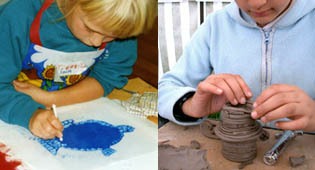











facing the future
Living in a digital age
You might think that advocating a life with more opportunities and experiences in ‘making things’ would suggest largely excluding digital technology from early childhood -
But this is not the proposition here. There are many opportunities offered by digital technology which are to be embraced, and these really outweigh any potential problematic issues. Society is changing widely, and no one wants their children disadvantaged.
But this is not the proposition here. There are many opportunities offered by digital technology which are to be embraced, and these really outweigh any potential problematic issues. Society is changing widely, and no one wants their children disadvantaged.
The scope of change currently taking place can be compared with the development of the Gutenberg Press in the 16th century, which facilitated printed book publishing, thereby allowing wide access to information which had previously been reserved for the very few.
Wikipedia describes this as the ‘printing revolution’:
"The printing press was an important step towards the democratisation of knowledge. Within fifty or sixty years of the invention of the printing press, the entire classical canon had been reprinted and widely promulgated throughout Europe. Now that more people had access to knowledge both new and old, more people could discuss these works."
Not only that, but more people could also read for enjoyment, and could read the news from far flung places.
There were cries of: how dangerous it would be if ordinary people could read and become knowledgeable! What ideas would develop? What mass revolutions would ensue?… Then came the Industrial Revolution, education for all, the end of slavery and servitude, ideals of equality and fair pay for a days work… are these the kind of changes to fear? Or to embrace?
Wikipedia goes on:
"On the other hand, the printing press was criticised for allowing the dissemination of information which may have been incorrect."
resource link > wikipedia 'the printing revolution’
We hear the same negative comments repeated now in reference to the internet, wikipedia, twitter, YouTube, Facebook -
With every new technology comes the fear of how detrimental it will be to individuals and to society. It is easy to forget there was the same hue and cry with the cinema and then television, as it is the same now with new digital technology.
Fears of childhoods tainted by the influence of unrestricted access to the internet at too young and age, childhoods lost to the inertia of computer games, and even that our brains will be significantly altered.
General downsides that are often expressed:
• Continual texting & communication causing a loss of ability to concentrate for any length
of time.
• Repetitive, pre-
• 'Friends' who are not friends
• Finding illegal, dubious, and sexually challenging stuff
• Living in a fantasy ‘virtual’ world where nothing has 'real' consequences
• Narrowing of horizons to a small screen instead of the wider expanse of the outside world
• Less opportunity for physical activity and adventure
The opportunities are wide ranging:
• Access to information and knowledge is abundant and ever expanding, at a level not dreamed
of by older generations -
• Serendipity -
• A visual revolution -
• A computing and calculating revolution -
• New ways of interacting with people, data and events
• Interactivity all over the world bringing us together, responding more easily to global events
• Easy access to a wide variety of technology and methods for communication helping those
who are disadvantaged to participate more fully
In an ever faster changing world the journey children go through as they grow and learn it is increasingly important to be one which is rich in a variety of experiences.
what do we mean -
• there is special knowledge and understanding to be gained by making things
• childhood plays a vital part in this innovative process
a historical perspective
• observation, trial and error
• origins of maths
• patterns and geometry
facing the future
growing concerns
• Neil MacGregor
• Sherry Turkle
• Seymour Papert